All English posts
Russia, New challengers for the Kremlin?
13 Dec 2011“ … Alexei Kudrin, a longtime Putin ally forced out as finance minister in September, said he wanted to help create a liberal party to fill a void exposed by Russia’s December 4 parliamentary vote, which set off mass protests over alleged fraud.
Billionaire Mikhail Prokhorov, a metals magnate, separately announced he would run in the March presidential vote expected to return Putin to the Kremlin after four years as prime minister. 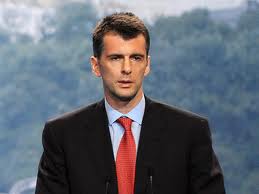
Both men cast themselves as potential leaders of liberal forces that have struggled to gain political representation, but analysts and opposition politicians raised questions about their motives and their independence from Putin and the Kremlin.
Kudrin said the election had shown the “dire” need for a strong liberal alternative. “Today one can say that the demand for the creation of such a structure is so high that it will certainly begin to be created,” Kudrin, 51, said in the interview published by the financial daily Vedomosti. “The process of the consolidation of liberal and democratic forces will now go forward. I am absolutely certain of this, and I myself am ready to support this,” Kudrin said, adding that it was too early to talk about a potential leader.
MIDDLE CLASS
Putin’s plan to return to the presidency and make Medvedev prime minister, unveiled in September, deepened feelings of many Russians that the future had been decided without their input. The Duma election increased a feeling of disenfranchisement.
Prokhorov, 46, described himself as a “defender of middle-class interests“. He told a news conference he was “ready to be an integrator” of Russia’s liberal, democratically minded opposition.
Both Prokhorov and Kudrin are relatively new to electoral politics and are fresh from public breaks with the Kremlin. Kudrin had been finance minister since 2000, the year Putin was first elected president, until he was forced out in September after criticizing President Dmitry Medvedev for lavish military spending plans.
Prokhorov, long seen as more of a playboy than a politician, briefly headed Right Cause, widely seen as a pocket party controlled by the Kremlin to win liberal support. But he quit, also in September, after a spat with Kremlin political strategist Vladislav Surkov, influential deputy head of the presidential administration.
Boris Nemtsov, a longtime Putin foe whose political party was denied registration by the Justice Ministry this year, barring it from the parliamentary vote, said he believed Prokhorov’s candidacy was engineered by the Kremlin. “This is a 100 percent Putin-inspired project,” he told Reuters.
A liberal party led by Kudrin, who rejected a Kremlin request to lead Right Cause earlier this year, could offer a way for Putin to channel discontent and reduce the threat posed by the biggest opposition protests since he came to power in 1999. “Of course the Kremlin wants to retain control and channel the energy that spilled out into the street on Saturday into a project that will be not be completely unpredictable,” said Maria Lipman, political analyst at the Carnegie Moscow Center.
Kudrin avoided strong criticism of Putin in the interview, saying he had done a good job softening the blow from the global financial crisis on Russia, and blaming United Russia for the lack of progress in fighting corruption and other problems. But he warned that the legitimacy of the presidential election would be undermined if the authorities ignore the allegations of fraud in the parliamentary vote.
Kudrin called for a recount “in certain polling districts and even regions” and said the Kremlin should consider dismissing the head of the Central Election Commission, Vladimir Churov, which is one of the protesters’ other demands… ”
FULL ARTICLE – Steve Gutterman – Reuters
| Party | 2011 | 6th Duma seats | 2007 | 5th Duma seats |
| United Russia | 49.32 | 238 | 64.3% | 315 – total 450 |
| Communist Party of the Russian Federation (CPRF) | 19.19 | 92 | 11.57% | 57 |
| A Fair Russia | 13.24 | 64 | 7.7% | 38 |
| LDPR | 11,67 | 56 | 8.14% | 40 |
| Yabloko | 3.43 | No | 1.5% | No |
| Right Cause | 0.6 | No | 0.96% | No |
| Patriots of Russia | 0.97 | No | 0.89% | No |
Turnout in 2011 … 60.2%
Turnout in 2007 … 63.71%
| United Russia | 48.5 | 46 | In 2007 64,3% |
| Communist Party of the Russian Federation (CPRF) | 19.8 | 21 | |
| A Fair Russia | 12.8 | 14.1 | |
| LDPR | 11.4 | 13.2 | |
| Yabloko | 4.17 | 3.6 | |
| Right Cause | 1.1 | 1 | |
| Patriots of Russia | 0.9 | 1 |
Euro 2012, final groups and schedule decided
3 Dec 2011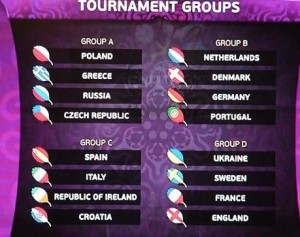 The schedule for UEFA EURO 2012 in Poland and Ukraine has been confirmed following the draw in Kyiv.
The schedule for UEFA EURO 2012 in Poland and Ukraine has been confirmed following the draw in Kyiv.
Poland will launch the tournament on Friday 8 June at 18.00CET against Greece in Warsaw followed by the other Group A opener between Russia and the Czech Republic at 20.45CET. The next day the Netherlands face Denmark in Kharkiv and Germany take on Portugal in Lviv to begin Group B, and on 10 June Group C starts as holders Spain play Italy and the Republic of Ireland are matched with Croatia.
Ukraine are involved in the last of the opening set of fixtures, meeting Sweden in Group D in Kyiv after England tackle France in Donetsk. The group stage runs until 19 June, then, after a rest day, the quarter-finals take place over four consecutive nights. The semi-finals are on 29 June in Donetsk and the following evening in Warsaw, before Kyiv stages the 1 July decider.
Match schedule
All kick-offs CET, Ukrainian time is one hour ahead
Friday 8 June 2012
#1: POL v GRE, 18.00CET, Warsaw
#2: RUS v CZE, 20.45CET, Wroclaw
Saturday 9 June 2012
#3: NED v DEN, 18.00CET, Kharkiv
#4: GER v POR, 20.45CET, Lviv
Sunday 10 June 2012
#5: ESP v ITA, 18.00CET, Gdansk
#6: IRL v CRO, 20.45CET, Poznan
Monday 11 June 2012
#7: FRA v ENG, 18.00CET, Donetsk
#8: UKR v SWE, 20.45CET, Kyiv
Tuesday 12 June 2012
#9: GRE v CZE, 18.00CET, Wroclaw
#10: POL v RUS, 20.45CET, Warsaw
Wednesday 13 June 2012
#11: DEN v POR, 18.00CET, Lviv
#12: NED v GER, 20.45CET, Kharkiv
Thursday 14 June 2012
#13: ITA v CRO, 18.00CET, Poznan
#14: ESP v IRL, 20.45CET, Gdansk
Friday 15 June 2012
#15: SWE v ENG, 20.45CET, Kyiv
#16: UKR v FRA, 18.00CET, Donetsk
Saturday 16 June 2012
#17: CZE v POL, 20.45CET, Wroclaw
#18: GRE v RUS, 20.45CET, Warsaw
Sunday 17 June 2012
#19: POR v NED, 20.45CET, Kharkiv
#20: DEN v GER, 20.45CET, Lviv
Monday 18 June 2012
#21: CRO v ESP, 20.45CET, Gdansk
#22: ITA v IRL, 20.45CET, Poznan
Tuesday 19 June 2012
#23: ENG v UKR, 20.45CET, Donetsk
#24: SWE v FRA, 20.45CET, Kyiv
Wednesday 20 June 2012
No matches
Thursday 21 June 2012
#25: 1A v 2B, 20.45CET, Warsaw
Friday 22 June 2012
#26: 1B v 2A, 20.45CET, Gdansk
Saturday 23 June 2012
#27: 1C v 2D, 20.45CET, Donetsk
Sunday 24 June 2012
#28: 1D v 2C, 20.45CET, Kyiv
Monday 25 June 2012
No matches
Tuesday 26 June 2012
No matches
Wednesday 27 June 2012
#29: W#25 v W#27, 20.45CET, Donetsk
Thursday 28 June 2012
#30: W#26 v W#28, 20.45CET, Warsaw
Friday 29 June 2012
No matches
Saturday 30 June 2012
No matches
Sunday 1 July 2012
#31: W#29 v W#30, 20.45CET, Kyiv
Source UEFA.com
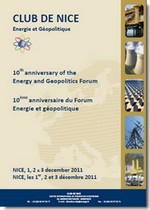 The “Club de Nice” has been initiated by request of the City of Nice and is run by the Institut Europeen des Hautes Etudes Internationales in cooperation with the Russian Academy of Sciences and the Centre de Recherches Enttreprises et Societes of Geneva. Its main goal is to offer public and private leaders in the field of energy a regular place to meet and discuss their specific problems in a constantly changing world.
The “Club de Nice” has been initiated by request of the City of Nice and is run by the Institut Europeen des Hautes Etudes Internationales in cooperation with the Russian Academy of Sciences and the Centre de Recherches Enttreprises et Societes of Geneva. Its main goal is to offer public and private leaders in the field of energy a regular place to meet and discuss their specific problems in a constantly changing world.
The work conducted as usual in partnership with the Russian Academy of Sciences bears upon the main topic global energy themes and the impact of their development on energy policy in Europe and Russia.
Forum December 1-3, 2011
Thursday, 1 December, 2011
3.30‐4.00 pm Opening session
Chairman: M. Valery KOSTIOUK, Secretary General of the Russian Academy of Sciences.
4.00‐5.00 pm Keynote speech
5.00‐6.00 pm Presentation of « Geopolitics of Energy », a book co‐produced by the Russian Academy of Sciences and Club de Nice Energie & Geopolitique.
Friday, 2 December, 2011
9.00‐11.00 am Round table 1: Oil and gas: producing countries and political risks The events that marked most Southern Mediterranean and Middle Eastern countries in 2011 revived the debate on the high political risks in international energy relations. Such risks are particularly high for European countries, obviously, as they rely heavily on external sources. What impact does this have on their basic energy policy decisions? Above and beyond national policies to diversify sources and suppliers, can a European approach be envisaged? Are solidarity mechanisms ‐ as in matters of finance ‐ conceivable? What lessons can be learnt for relations with Russia?
11.00 am‐1.00 pm Round table 2: Public action and energy policy The recent catastrophes at Deep Water Horizon and in Fukushima have raised the question once again of the compatibility of the interests of private companies with those of society in general. Today more than ever, defining and implementing an energy policy would seem to call for compromise. Given the power of the companies ‐ which knows no borders ‐, and the different levels of public regulation (local, national and international), what kind of control is possible?
2.30‐4.30 pm Round table 3: What future for nuclear power? The Fukushima catastrophe was widely covered in the media, triggering a tidal wave of emotion all over the world. At the very time when nuclear power seemed to be taking off again, Fukushima caused decisions that had already been taken to be hastily reconsidered and occasionally overturned. A scientific, technical, economic and political debate on nuclear power and on the conditions for harnessing it is now vital, particularly for Europe and Russia.
4.30‐6.30 pm Round table 4: Energy efficiency and partnership in the Europe‐Russia dialogue Russia has a lot to gain from better energy efficiency, both in terms of the energy savings that could result (several hundred million TOE between now and 2020 according to the European Commission) and in infrastructure investments required for developing a suitable policy (over 700 billion euros according to the same source). In a policy document entitled “Energy Strategy to 2020”, Russia has embraced this challenge as one of its major objectives. It also constitutes a key topic in energy discussions with the European Union. Extending the partnership in this field emerges as a jointly beneficial priority.
7.00 pm Reception
Saturday, 3 December, 2011
9.00‐11.00 am Round table 5: Energy and Mediterranean cooperation For those who live on its shores, and in particular for Europeans, the Mediterranean is becoming the linchpin in energy security policy. Over 30% of Europe’s consumption has traditionally transited through the Mediterranean, and this role is set to develop with increased gas imports from Central Asia and Russia, extensions to oil and gas pipeline networks in the zone, and growing methane traffic (Algerian, Libyan and Nigerian LNG heading for Europe). This evolution is of major importance to Russia; the country is not only a keen observer, but also a key player. Furthermore, the complementary nature of energy interests in the South with its exports, and in the North as a natural client out of necessity, opens avenues for cooperation in line with global tendencies towards energy diversification. Projects such as “Désertec” (for the mass production of solar energy in the Sahara), and “Transgreen”, now called “Medgrid” (to carry that solar energy to Europe via the Mediterranean), are part of the Union for the Mediterranean’s “Solar Plan”.
11.00‐12.30 am Summary of debates. Conclusions.
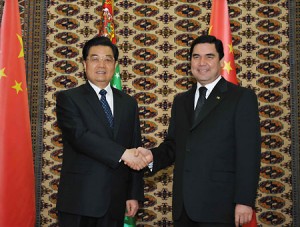 Relations between Turkmenistan and China are long-term and strategic. “These relations stood the test of time, proven their efficiency and now are a major factor of stability and development in the Eurasian space,” President Gurbanguly Berdimuhammadov said in an interview before his official visit to Beijing.
Relations between Turkmenistan and China are long-term and strategic. “These relations stood the test of time, proven their efficiency and now are a major factor of stability and development in the Eurasian space,” President Gurbanguly Berdimuhammadov said in an interview before his official visit to Beijing.
In December 2009 Turkmenistan-China gas pipeline was commissioned. “This is an outstanding event. This project is of strategic importance for both sides, meets long-term interests of Turkmenistan and China, as well as logic of global economic development, in which energy supplies play an increasing role,” Berdimuhammadov told Chinese journalists.
The Turkmen leader stressed that Ashgabat jointly with Chinese partners is working on further increase in the supply of Turkmen gas to Beijing in view of increasing demands in China’s economy and great opportunities of Turkmenistan’s resource base. “China is not just a huge and great country, a powerful global economic and industrial centre, a vast and promising market for Turkmenistan. It is a reliable and trusted friend,” Berdimuhammadov highlighted.
At the same time China is ready to work with Turkmenistan to create a good environment for their business cooperation. Cooperation between the two countries has seen achievement in economic, trade, energy, transportation and other fields in recent years, Chinese Vice Premier Wang Qishan told at a business forum.
In last weeks Ashgabat issued an angry response to Russian scepticism over the size of its natural gas reserves and reinforced its ambition to find new energy markets in Asia and Europe that will cut its dependence on the Kremlin. BP data ranks natural gas reserves in Turkmenistan, a Central Asian nation of 5.4 million, as the world’s fourth-largest. The country is seeking alternative export routes to meet its goal of more than tripling natural gas output by 2030.
Auditor Gaffney, Cline & Associates has ranked the South Iolotan natural gas field as the world’s second-largest after South Pars in Iran, saying last month it could contain between 13.1 trillion and 21.2 trillion cubic metres. But Alexander Medvedev, deputy chief executive of Russian gas export monopoly Gazprom, called these estimates into question. “I believe that there are no grounds … and no reason to make such statements that there is such a natural deposit with reserves of this scale,” Medvedev said.
Ashgabat, at odds with Moscow over its plans to export gas to Europe, issued a strongly worded statement, expressing “bewilderment over the biased assessment by a professional” and calling Gazprom‘s remarks “utterly tactless”. Turkmenistan has expanded gas exports to next-door Iran and launched a pipeline to China. It has also won strong support from the European Union and the United States for plans to supply gas to a trans-Caspian pipeline that will run to Europe via Azerbaijan.
Turkmenistan’s annual natural gas output is estimated to have averaged around 70 billion cubic metres in the 20 years of independence from the Soviet Union. Turkmenistan aims to produce 230 bcm of the fuel annually by 2030.
(Sources – Xinhua, Reuters, Trend)
Polish priorities in next 4 years.
10 Nov 2011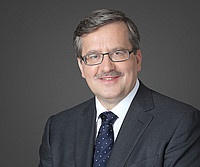 The need for economic growth, the demographic changes, and the preparation for entering into the eurozone are the top three priorities for Poland in the next four years according to President Bronislaw Komorowski. The head of State gave a speech at the new Parliament lower house Sejm’s inaugural meeting.
The need for economic growth, the demographic changes, and the preparation for entering into the eurozone are the top three priorities for Poland in the next four years according to President Bronislaw Komorowski. The head of State gave a speech at the new Parliament lower house Sejm’s inaugural meeting.
The first challenge is to “improve state’s functioning,” Komorowski said, underlining that in times difficult for Europe “only courageous and wise actions will allow Poland to continue stable economic growth.”
Poland must pay attention to growing life expectancy, and low total fertility rate. “The forecasts give a reason to worry and require a deep analysis,” he highlighted. The necessary steps should include “public debate about gradual increase of retirement age” to assure decent pension benefits, “support for responsible parenting” and completing the healthcare system reform.
The third challenge is the crisis in Europe. Poland should “reach the readiness to adhere to the eurozone,” Komorowski said. “It is about awareness that this is the way leading to further development.” Clearly the condition is to contain the current crisis,” the President observed. “Without membership Poland will be deprived of a chance to play a role in the world, adequate to our aspirations.”
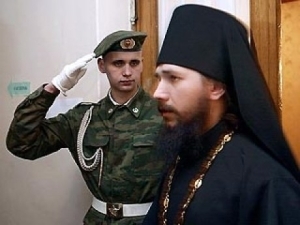 For the first time in the history of modern Russian Army Forces a training for priests and military officials has been organized. The event takes place in the southern city of Rostov-on-Don and it is attended by army chaplains, who have already started working with troops, and by military officials of the Department for relationship with religious soldiers. The main issue of the meeting is to collect requirements and recommendations for dealing with religious people in the Army.
For the first time in the history of modern Russian Army Forces a training for priests and military officials has been organized. The event takes place in the southern city of Rostov-on-Don and it is attended by army chaplains, who have already started working with troops, and by military officials of the Department for relationship with religious soldiers. The main issue of the meeting is to collect requirements and recommendations for dealing with religious people in the Army.
On July 21, 2009 President Dmitry Medvedev supported the initiative of the leaders of the major Russian religious communities to recreate the institution of military clergy abolished in 1918. According to the following approved program in the Russian Army there will be 240 staff positions of priests and nine civilian positions to coordinate chaplains’ activity. Since the beginning of 2011 the Black Sea Fleet and the Russian military bases in the republics of Abkhazia, South Ossetia and Armenia have their own religious personnel.
Poland and its future in the eurozone.
2 Nov 2011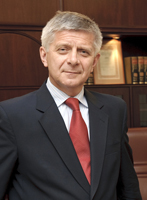 The prospect of Polish adoption of the euro became “clearer” after last summit of European leaders in Brussels. Polish central bank Governor Marek Belka is sure of it “even if we don’t want to name an entry date immediately.” The euro-area is moving toward closer political union, and Poland will “one day enter a new, different eurozone that carries the traits of a federation more than it does today,” said the Governor.
The prospect of Polish adoption of the euro became “clearer” after last summit of European leaders in Brussels. Polish central bank Governor Marek Belka is sure of it “even if we don’t want to name an entry date immediately.” The euro-area is moving toward closer political union, and Poland will “one day enter a new, different eurozone that carries the traits of a federation more than it does today,” said the Governor.
But a new poll finds that opinion continues to turn against adopting the single European currency. Fifty three percent of respondents told the OBOP pollsters that accession to the eurozone will be unfavourable for Poland.
Sixty five percent think that adopting the euro will have a negative impact on their household and 49 percent said they thought the single currency would have a negative effect on the economy. Only 22 percent thought the euro would be positive for the economy, 11 percent that it would have no effect and 18 percent answered “don’t know”. In 2007 the government said that they aimed to join the eurozone by 2012, but the finance crisis and debt levels forced to delay the plans.
Full Interview – Der Spiegel –
Belarussian average salaries in free fall.
26 Oct 2011“In Belarus, the nominal average monthly salary in January-September amounted to Br1.72 million, including for September – Br2.26 million (13.4% or Br267.8 thousand more than in August). This was reported by the National Statistics Committee. However, when Br1.72 million was equal to $570.48 at the rate of the National Bank on February 1, then on October 1 it made only Br304.96.
As for the rate of the extra session on the Belarussian Currency and Stock Exchange (BCSE), the above sum was only $225.43 on September 30. With regard to the size of the September salary at the rate of the National Bank, it was equal to $400.71 on October 1, while at the rate of the BCSE on September 30 – $296.2.
Real wages in rubles (adjusted to the growth of consumer prices of goods and services) for the first nine months of the year grew by 8.2%, while in September it fell by 0.2% compared with August.
Gross average salary of civil servants amounted to Br2.28 million in September, while in August – Br2.01 million.
According to statistics, the average September salary in the industry amounted to Br2.54 million, in construction – Br2.38 million, transport and communications – Br2.32 million, agriculture, forestry and hunting – Br1.54 million, education – Br1.93 million (teachers – Br2.14 million, the faculty – Br2.76 million).
Average earnings of medical and social workers made Br2.05 million. Health staff received an average of Br2.08 million, doctors – Br2.98 million, the nursing staff – Br2.02 million.
As Telegraf previously reported, followed by the BCSE extra session, held on September 14, the average salary decreased by $135 per day in the country.”
source: Telegraf.by
Welcome
We are a group of long experienced European journalists and intellectuals interested in international politics and culture. We would like to exchange our opinion on new Europe and Russia.
Categories
- Breaking News (11)
- CIS (129)
- Climate (2)
- Energy&Economy (115)
- EU Eastern Dimension (85)
- Euro 2012 – Sochi 2014 – World Cup 2018, Sport (43)
- Euro-Integration (135)
- History Culture (198)
- International Policy (261)
- Military (74)
- Interviews (18)
- Italy – Italia – Suisse (47)
- Odd Enough (10)
- Poland and Baltic States (126)
- Religion (31)
- Russia (421)
- Survey (4)
- Turning points (4)
- Ukraine (176)
- Российские страницы (113)
Archives
- November 2020
- October 2020
- September 2020
- August 2020
- July 2020
- May 2020
- April 2020
- March 2020
- January 2020
- December 2019
- November 2019
- October 2019
- September 2019
- August 2019
- July 2019
- June 2019
- May 2019
- April 2019
- March 2019
- February 2019
- December 2018
- November 2018
- October 2018
- September 2018
- August 2018
- July 2018
- June 2018
- May 2018
- April 2018
- March 2018
- February 2018
- January 2018
- December 2017
- November 2017
- October 2017
- September 2017
- August 2017
- July 2017
- May 2017
- March 2017
- January 2017
- December 2016
- November 2016
- October 2016
- September 2016
- July 2016
- June 2016
- May 2016
- April 2016
- February 2016
- January 2016
- November 2015
- October 2015
- September 2015
- June 2015
- April 2015
- March 2015
- February 2015
- January 2015
- December 2014
- November 2014
- October 2014
- September 2014
- August 2014
- July 2014
- June 2014
- May 2014
- April 2014
- March 2014
- February 2014
- January 2014
- December 2013
- November 2013
- October 2013
- September 2013
- August 2013
- July 2013
- June 2013
- May 2013
- April 2013
- March 2013
- February 2013
- January 2013
- December 2012
- November 2012
- October 2012
- September 2012
- August 2012
- July 2012
- June 2012
- May 2012
- April 2012
- March 2012
- February 2012
- January 2012
- December 2011
- November 2011
- October 2011
- September 2011
- August 2011
- July 2011
- June 2011
- May 2011
- April 2011
- March 2011
- February 2011
- January 2011
- December 2010
- November 2010
- October 2010
- September 2010
- August 2010
- July 2010
- June 2010
- May 2010
- April 2010
- March 2010
- February 2010
- January 2010
- December 2009
- November 2009
- October 2009
- September 2009
- August 2009
Our books




